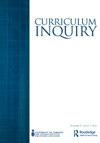Confronting colonial violences in and out of the classroom: Advancing curricular moves toward justice through Indigenous Maternal Pedagogies
IF 1.6
3区 教育学
Q2 EDUCATION & EDUCATIONAL RESEARCH
引用次数: 0
Abstract
Abstract This article documents ongoing encounters with colonial violence throughout education by offering a glimpse into the ways I experience this as a racialized faculty member who teaches courses related to anti-Indigenous racism. It extends Indigenous Maternal Pedagogies and engages theorists who identify colonial violence as structurally embedded throughout education. This article advances curricular moves toward justice through Indigenous Maternal Pedagogies to explore the lessons that can be gleaned from teaching a graduate seminar on colonial violences in education. The course served as a pedagogical site for critical and unsettling conversations as students were prompted to reckon with their own positionalities as they relate to settler colonialism, consider how violence happening outside of classroom spaces is manifested and reproduced in schools, and think critically about educational responses to ongoing colonial violences. By enacting Indigenous Maternal Pedagogies, the course also became a site for liberatory praxis through the co-creation of an ethical space for engagement. The intention of the course was to prompt socio-political action beyond the classroom. Moreover, extending bell hooks’s sentiment that the classroom, despite its limitations, remains a site of possibility, Indigenous Maternal Pedagogies transcend classrooms spaces, as sites of resistance, to call for the change our current political moment demands.直面课堂内外的殖民暴力:通过土著母亲教育学推动课程走向正义
摘要这篇文章记录了我在整个教育过程中不断遭遇的殖民暴力,让我们一窥我作为一名教授反土著种族主义相关课程的种族化教师的经历。它扩展了土著母亲教育学,并让理论家们参与进来,他们认为殖民暴力在结构上植根于整个教育中。本文通过《土著母亲教育学》推动课程走向正义,探索在教育中殖民暴力问题研究生研讨会上的教学经验。该课程是批判性和令人不安的对话的教学场所,学生们被要求思考自己与定居者殖民主义的关系,思考课堂外发生的暴力行为如何在学校中表现和再现,并批判性地思考教育对持续的殖民地暴力行为的反应。通过颁布《土著母亲教育学》,该课程还通过共同创造一个参与的道德空间,成为解放实践的场所。该课程旨在促进课堂之外的社会政治行动。此外,扩展了贝尔胡克的观点,即尽管教室有局限性,但它仍然是一个可能的场所,土著母亲教育学超越了教室空间,成为抵抗的场所,呼吁我们当前政治时刻所要求的变革。
本文章由计算机程序翻译,如有差异,请以英文原文为准。
求助全文
约1分钟内获得全文
求助全文
来源期刊

Curriculum Inquiry
EDUCATION & EDUCATIONAL RESEARCH-
CiteScore
3.10
自引率
17.60%
发文量
37
期刊介绍:
Curriculum Inquiry is dedicated to the study of educational research, development, evaluation, and theory. This leading international journal brings together influential academics and researchers from a variety of disciplines around the world to provide expert commentary and lively debate. Articles explore important ideas, issues, trends, and problems in education, and each issue also includes provocative and critically analytical editorials covering topics such as curriculum development, educational policy, and teacher education.
 求助内容:
求助内容: 应助结果提醒方式:
应助结果提醒方式:


